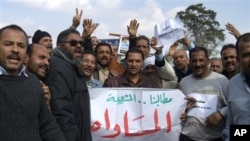A scholar said there is growing support among Egyptian protesters that President Hosni Mubarak should be “militarily forced out,” if he continues to defy protesters’ demand to immediately step down and cede power.
Howayda Mostafa, professor of mass communications at the University of Cairo, told VOA the protesters do not have confidence in the present administration’s promise of “total” reforms they are demanding.
“Reforms or not, the protesters do not trust the regime anymore. So, they don’t even want to make negotiations with them until President Mubarak is out. Even the reforms that President Mubarak has instructed do not seem enough for the protesters because they are thinking that it is not real reform. They don’t trust these procedures,” said Mostafa.
“They think that the government is biding their time to calm the protesters. They are looking for a new regime. They don’t want, for example, the vice president; before, he was a good figure and popular figure, but now they consider that Omar Suleiman is one of the regime (members). So, they refuse the idea of a transfer of power (from Mr.) Mubarak to Omar Suleiman.”
At a news briefing Wednesday, White House Press Secretary Robert Gibbs said the Egyptian government has yet to meet the minimum threshold of reforms demanded by protesters.
Mostafa said the protesters do not believe that Vice President Suleiman can lead, in her words, any serious transformation they are demanding.
“Many of the Egyptian protesters are now talking about, if (Mr.) Mubarak doesn’t go, or if there is no solution, the military (action) solution would be the last option, or the last solution,” said Mostafa.
Egypt's Vice President said the government will not tolerate prolonged anti-government protests in Cairo's main square, where protester numbers swelled to the hundreds of thousands Tuesday.
Egypt's state-run news agency, MENA, quoted Suleiman as saying that the crisis triggered by 16 days of anti-Mubarak protests in Tahrir Square must end “as soon as possible.”
MENA says Suleiman told a group of newspaper editors that the presence of anti-Mubarak activists and satellite television stations in the square was making Egyptian citizens "hesitant to go to work" and disrupting daily life. He accused the satellite television stations of "insulting" Egypt, without naming them.
Suleiman also is quoted as saying the government does not want to deal with Egyptian society using "police tools" and prefers to use dialogue to try to address the protesters' demands.
Meanwhile, Egyptian workers are also reportedly beginning to press home their demands for democratic reforms.




